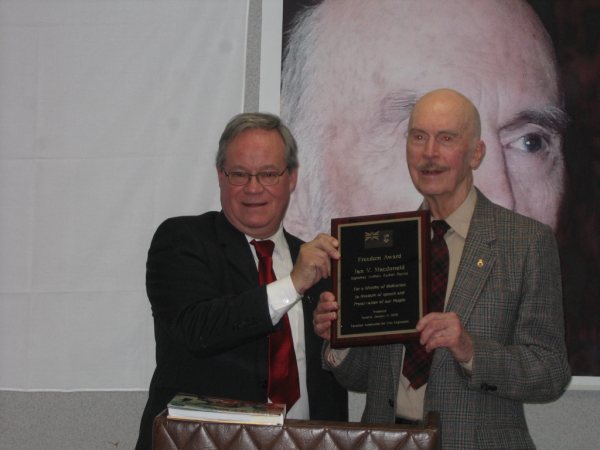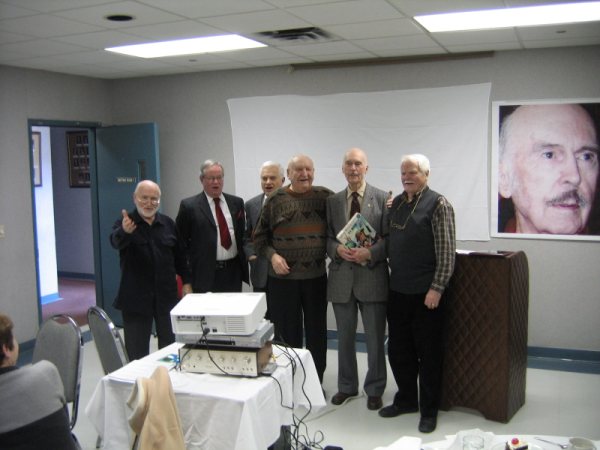Ian Verner Macdonald (January 19, 1925 – June 28, 2022) R.I.P.
Canada lost an outstanding free speech warrior, historical revisionist and free thinker, June 28 with the death of Ian Verner Macdonald, well into his 99th year. Ian was the son of the late John A. and Katherine Macdonald. He was one of the first to be born in the newly-built Ottawa Civic Hospital on January 1925 and grew up in Old Ottawa South with summers spent in Sherbrooke, Nova Scotia where both of his parents were born. A true patriot all of his life, he served in the RCAF and RN Fleet Air Arm during WWII and had a lifelong love of aviation. With degrees in economics from Queen’s University and University of Toronto, he wrote the Foreign Service Exam, placing second nationwide, and then went on to a career as a trade diplomat that took him officially to over 50 countries.
His numerous unprecedented accomplishments in this career made him arguably the most productive trade official then in Canadian history. Always a Canada Firster, in the mid-60s he urged taking advantage of trade opportunities with the increasingly wealthy Arab world. After six foreign postings, on five continents, he was appointed Chief of Planning and Policy for export development from which position he was able to propose programmes and policies based on practical experience that would greatly improve the efficacy of government assistance to Canadians seeking to do business abroad. In the mid-‘sixties, he strongly recommended cultivation of the lucrative and receptive Arab markets where he had been assured by top-level officials and businessmen that Canada, because of its perceived independent, non-partisan foreign policy, was their trading partner of choice. Much to his dismay, Canadair reported that the sale he had negotiated for supply of jet trainers to the Sultan of Oman’s Air Force (SOAF) had been vetoed by Foreign Affairs, an affront to Sultan Said bin Taimur that cost Canada heavily in prospective earnings. More importantly, his high-level discussions to train and equip the embryo Saudi Air Force, for which a $400 million down payment was offered, failed to receive support in Ottawa and was never consummated.
To add to the folly, his Middle East and North African trade policy proposals, no matter how astute and prescient, were opposed furiously by an influential foreign-affiliated lobby (with several moles in the Department and the ear of the Minister) who intervened to have the policy advisor summarily dismissed from the Foreign Service for his audacious devotion to duty. He was tricked out of an easily-won appeal of his “wrongful dismissal” by a false promise of reinstatement “as soon as the heat from the Jewish Lobby dies down” – on condition he not appeal nor seek outside assistance. Because of his well-founded suspicion of foreign intrigue, he contacted RCMP Security (and subsequently the Canadian Security Intelligence Service), only to find that they were “not interested”. So ended his chosen career.Betrayed, deceived and rebuffed, deserted by intimidated colleagues, but undaunted, he searched for alternative opportunites in government and soon landed a job, in overseas project marketing, that suited his talents. He brokered Canadian construction of a major luxury resort project at Cayo Sabinal, Cuba, by raising $171 million in Canadian financing for the American sponsors but the project was stalled by the imposition of U.S. sanctions. After a decade of forming Canadian consortia and globe-trotting on their behalf in search of project opportunities, he again ran afoul of the Lobby and again was fired – this time for successfully negotiating major concessions and joint ventures agreements in Libya worth billions of dollars and a $700 million agricultural project in Saudi Arabia, unprecedented accomplishments that were condemned and vetoed by his furious titular superiors as “contrary to instructions”.
Meanwhile, in his spare time, he founded different ventures including manufacturing vinyl-based dental plastics, opening a feldspar mine, establishing a downtown gallery in Ottawa, building Marrakesh, a lavish-decor Hollywood-theme restaurant, etc. As a WWII veteran with rich diplomatic experiences and advanced news writing training at Wayne State University in Detroit and as an amateur historian, he was drawn to study the history of the war. He produced hundreds of iconoclastic treatises on WWII and Middle Eastern issues. He wrote numerous published articles and was the subject of articles written by others on his outspoken patriotism and unflagging efforts to expose subversion and corruption in government.
In the spring of 1987, on behalf of the Government of Libya with which he had kept contact since 1972 through Libya’s UN Ambassador, he recruited a 96 member Canadian delegation to an International Peace Gathering called by Col. Muammar Ghaddafi to commemorate the previous year’s U.S. attack on Tripoli and Bengazi, in which the President’s two year daughter was killed. The conference was infiltrated by Libya’s enemies intending to stage an “ugly incident” to discredit the proceedings, the main feature of the proposed incident to be the high-profile organizer of the Canadian delegation. When Ian was able to evade the planned assassination thanks to a tip, the only journalist on the mission (the perceptive, insightful young Christoph Halens from the Ottawa Citizen, a graduate of the Carleton University School of Journalism eager to make his mark by covering the Conference) tragically became the alternative victim. With the Libyan outrage in mind, the Ian vigorously petitioned the Commissioner of the RCMP, the Foreign Affairs Department and the Belgian Embassy to investigate the subsequent murder by Israel of Canadian scientist and inventor Dr Gerald Bull (who had contracted his services to the Government of Iraq) but without effect, despite the availability of the prime witness (Victor Ostrovsky, former Mossad agent ) in Ottawa. He continued to be the victim of attempts to impoverish him and otherwise dampen his spirit including death threats, none of which campaigns has been wholly successful, however disconcerting. Two of his houses were destroyed by arson, and a third seriously damaged. He felt Canada had been betrayed again as cabalistic power-brokers and venal politicians trash our priceless British-French heritage and compete to sacrifice the country’s birthright and sovereignty for sordid political advantage and personal gain. He feared that Canada today is no longer a respected, confident, homogeneous, independent, Christian union but is becoming increasingly a dispossessed, demoralized, turbulent, unstable, lobby-driven, multicultural, multiracial, Godless, leaderless, confused, disintegrating, Americanized polyglot, essentially without national character, without cohesion, without historical integrity, without pride and without common purpose.
He was an avid musician leading a dance band while at Queen’s University, forming his own Swing band while living in South Africa, and playing trombone with various bands up until he was 92. He strived to make every minute count in all his varied endeavours, and he excelled at everything he did – as the Manager of the Queen’s Brass and Pipe Bands, as the top-performance trade diplomat, as an ardent Ottawa heritage promoter, as an ambitious entrepreneur, as an insatiable writer and reader. As an undaunted truth defender and great Canadian patriot, he remained true to his integrity and principles to the very end of his life.
Ian Macdonald wrote thousands of crisp, well documented letters-to-the-editor on forbidden topics like Zionist influence in public policy, Canada’s failed immigration policies and a reconsideration of Canada’s role in WWII. Almost none appeared in Canada’s “free” press. They have been circulated on the Internet and many will appear as part of a book about to go to press just before Ian died. On January 14, 2010, the Canadian Association for Free Expression gave him a freedom award at a luncheon in Toronto, citing his “lifetime of dedication to freedom of speech and the preservation of our people.”
Intellectually active to the end, Ian Macdonald practised Rudyard Kipling’s advice to his son “to fill the unforgiving minute with sixty seconds worth of distance run.”


Tributes have begun to pour in as people around the world learned of Ian’s death. Among the first to arrive was from Mark Weber, Director of the Institute for Historical Review in Orange County, California: ” ’m grateful to have known this extraordinarily curious, productive and compassionate man. I remember Ian most vividly from the unforgettable days in May 2012 when he and Lydia welcomed me, my wife and step-son as guests at his rambling, museum-like home in Ottawa. I remember well our wide-ranging conversations, and how much I appreciated what he told me about his tumultuous life.”
